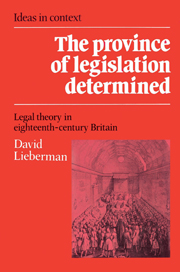Book contents
13 - From Blackstone to the Pannomion
Published online by Cambridge University Press: 10 October 2009
Summary
THE IDEA OF A NATURAL ARRANGEMENT
When Bentham published An Introduction to the Principles of Morals and Legislation in 1789, it was already some nine years overdue. The work, originally composed for “no other destination than that of serving as an introduction to a plan of a penal code,” had been virtually complete (and most of it in print) by 1780. But in correcting some “flaws” in his creation, Bentham “found himself unexpectedly entangled in an unsuspected corner of the metaphysical maze.” The process of metaphysical disentanglement led to Of Laws in General, which Bentham finished two years later. Bentham entertained several schemes for the publication of this more general and systematic examination of law, but the work ultimately remained in manuscript throughout his lifetime. For our purposes, the most important result of the discussion in Of Laws in General was to enable Bentham to depict, in outline at least, the nature of a comprehensive system of legislation. The structure of this legislative system centered on a novel account of a logically unified and exhaustive classification of law, and its elaboration marked the decisive final phase of Bentham's youthful engagement with English legal orthodoxy. It was this intellectual breakthrough which gave substance, if not realization, to his lifelong ambition to construct “a complete body of law; a pannomion, if so it might be termed.”
- Type
- Chapter
- Information
- The Province of Legislation DeterminedLegal Theory in Eighteenth-Century Britain, pp. 257 - 276Publisher: Cambridge University PressPrint publication year: 1989
- 1
- Cited by

